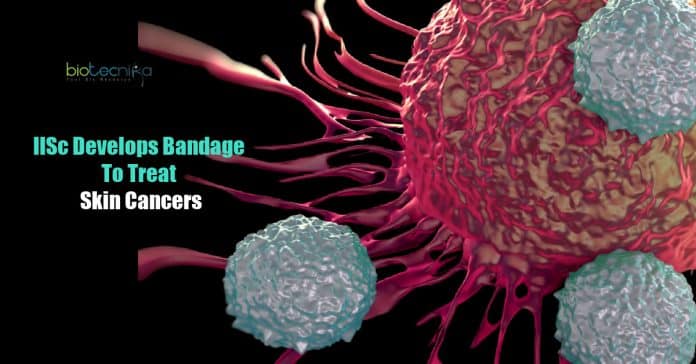IISc develops bandage to treat skin cancers.
Researchers at the Indian Institute of Science (IISc) have developed a bandage that can treat skin cancer. The non-invasive bandage is made of magnetic nanofibers and treats tumor cells by administering heat.
The researchers from different departments of the institute came together for developing this bandage. The researchers from the Department of Molecular Reproduction, Development, and Genetics and Centre for BioSystems Science and Engineering developed the unique blended magnetic nanoparticle bandage. The bandage was made by a method called electrospinning.
The bandage is made of polycaprolactone (PCL, a biodegradable polymer) pasted on a surgical tape along with nanoparticles from iron oxide, Fe3O4. Heat is generated when a high-frequency oscillating magnetic field is applied to the magnetic material in the bandage says IISc.
Kaushik Suneet, the first author of the study, explained that two experiments were carried out in order to investigate if the heat generated and dissipated by the magnetic bandage can prove to be therapeutic for skin cancer. One of the two experiments was an in-vitro experiment and the other was in-vivo. Human cancer cell lines were used for the in-vitro experiment and the in-vivo experiment was carried on mice with artificially-induced skin cancer.
The results from both the experiments were promising. The AMF generated heat in the nanofibrous magnetic field was able to successfully kill the cancer cells without affecting the healthy tissue and there was no sign of burns, inflammation, or thickening from the heat-generating bandage.
Skin cancer is the most common among cancers and is caused by too much exposure to ultraviolet sun rays. There are two types of skin cancers: melanoma, develops on melanocytes (the pigment cells in the skin), and non-melanoma, develops on other skin cells. Non-melanoma skin cancer is extensive but malignant melanoma is more fatal.
Skin cancer is generally treated by surgery, chemotherapy, and radiation therapy, but these conventional therapies have their limitations. Hyperthermia is a promising alternative to conventional treatments to address skin cancer. It involves heat application to the affected tissue. In order to target cancer cells effectively and selectively, researchers in recent years have been working on developing ways to deliver heat to tumor tissues.
IISc develops bandage to treat skin cancers.
































